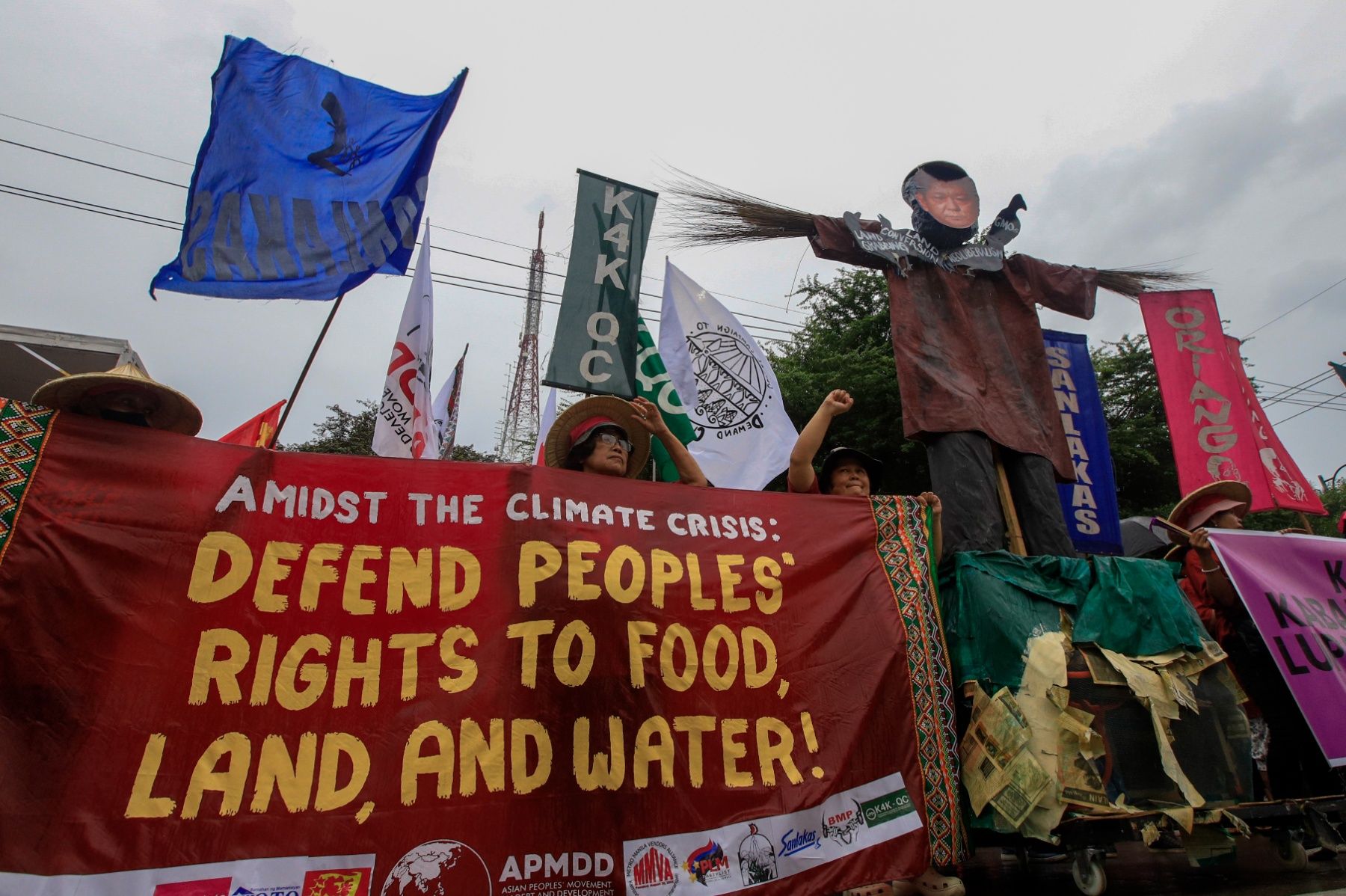Climate and environmental activists in Asia held protests in seven countries on Wednesday, October 19, to demand governments to address the global food and climate crisis.
The protests held in India, Pakistan, Nepal, Bangladesh, Thailand, Indonesia and the Philippines are part of the Asia Day of Action on Food and Climate timed to coincide with the celebration of World Food Day and the World Food Forum taking place on October 16-20 at the headquarters of the Food and Agriculture Organization (FAO) in Rome, Italy.
Rally vs Exports
In the Philippines, more than 1,000 protesters marched from the National Housing Authority (NHA) to the Department of Agriculture office in Quezon City, slamming the export-led agricultural model and called on the national government to protect and ensure the right to food amid the escalating impacts of climate change on top of deeply embedded inequalities in the global food system.
“We demand sustainable food systems that prioritize domestic food needs and ensure adequate and nutritious food for all,” said Lidy Nacpil, coordinator of Asian Peoples’ Movement on Debt and Development (APMDD).
Multiple Crises
Nacpil said the world is experiencing a major food crisis due to inflation of food and energy prices and the impacts of climate change.
The confluence of multiple crises is deeply exacerbating global hunger caused by export-oriented, industrial, and corporate-dominated agrifood systems.
Primacy to Food Production
“Southern and Asian governments have made themselves complicit and subservient to big agribusiness. They have allowed big agribusiness to monopolize land, seed, chemicals and agricultural technology and continue the colonial legacy and neo-colonial policies of import-dependence and export-orientation.
"Staple food farms for domestic consumption are marginalized in favor of cash crop plantations for global exports. In the face of escalating climate impacts on food, we need to give primacy to our ability to produce food for our own needs,” said Nacpil.
Malnourished
Over half of the world’s undernourished lives in Asia , totaling 402 million or 55 percent of the global population of undernourished, according to FAO.
The devastating impacts of food supply shocks and global price hikes on food, fuel, fertilizer, and energy are felt across the world but most especially in Asia, given the region’s rising dependence on the global market and disproportionate share of low-income households.
A new analysis by FAO found that billions of people in the world cannot afford a healthy diet . The greatest increase in the cost of a healthy diet, and consequently, the greatest increase in the number of people unable to afford it, is in Asia.
Some 78 million more people in Asia now cannot afford a healthy diet as it has become 4 percent more expensive.
Agricultural Monopoly
“The lack of government regulation on big food corporations has led to corporate land-grabbing and rural militarization, food price speculation and manipulation, soil destruction through monocultures and excessive chemical use, the criminalization of independent farming, and the massive displacement of farmers worldwide,” said Flora Santos of K4K-QC and the Metro Manila Vendors Association.
“We call on our governments to end agricultural monopolies, phase out pesticide and herbicide use, democratize land, seed, and technological ownership, and enable the participation, if not leadership, of smallholder food producers in decision-making affairs on national and local agriculture,” said Santos.
“The consequences of dominant food trade models are striking: severe domestic food drains and shortages in the Global South, amid record-high global food prices—plunging farmers into debt, poverty, and forced migration, and the people into hunger,” said Val Vibal of Aniban ng Manggagawang Agrikultura.
Agroecology
“We call on Asian governments to protect farmers and vulnerable groups, prioritize staple food over export crop plantations, stop land grabs and support farmers’ local, independent, and sustainable food production for domestic food needs,” said Vibal.
“Asia, as the world’s most disaster-prone region, has faced billions’ worth of food losses from increasingly more severe and frequent typhoons, floods, droughts, and landslides due to the worsening climate crisis. We call on Asian governments to implement a rapid, just, and equitable phaseout of fossil fuels and phase-in of renewable energy.
"We likewise call on governments to direct resources toward actualizing climate-resilient food systems, and support traditional and indigenous knowledge and practices for sustainable food production through peoples’ agroecology,” said Nacpil. (Annalyn Jusay)
#WorldFoodDay #AsiaDayOfActionOnFoodAndClimate #ClimateActivists #EnvironmentalActivists #ClimateCrisis #WorldFoodForum #FAO #NHA #DA #APMDD #OpinYon #WeTakeAStand
